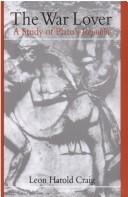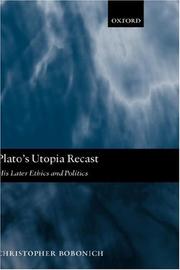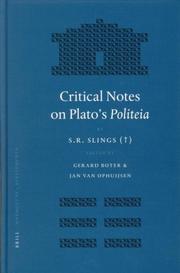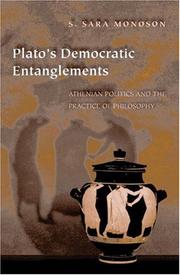| Listing 1 - 10 of 12 | << page >> |
Sort by
|
Book
ISBN: 1498542700 Year: 2017 Publisher: Lanham, Maryland : Lexington Books,
Abstract | Keywords | Export | Availability | Bookmark
 Loading...
Loading...Choose an application
- Reference Manager
- EndNote
- RefWorks (Direct export to RefWorks)
In this book, Mary Townsend proposes that, contrary to the current scholarship on Plato's Republic, Socrates does not in fact set out to prove the weakness of women. Rather, she argues that close attention to the drama of the Republic reveals that Plato dramatizes the reluctance of men to allow women into the public sphere and offers a deeply aporetic vision of women's nature and political position--a vision full of concern not only for the human community, but for the desires of women themselves. --! From back cover.
Women. --- Plato. --- Republic (Plato)
Book
ISBN: 143847914X 9781438479149 Year: 2020 Publisher: Albany
Abstract | Keywords | Export | Availability | Bookmark
 Loading...
Loading...Choose an application
- Reference Manager
- EndNote
- RefWorks (Direct export to RefWorks)
"Although Plato has long been known as a critic of imagination and its limits, Marina Berzins McCoy explores the extent to which images also play an important, positive role in Plato's philosophical argumentation. She begins by examining the poetic educational context in which Plato is writing and then moves on to the main lines of argument and how they depend upon a variety of uses of the imagination, including paradigms, analogies, models, and myths. McCoy takes up the paradoxical nature of such key metaphysical images as the divided line and cave: on the one hand, the cave and divided line explicitly state problems with images and the visible realm. On the other hand, they are themselves images designed to draw the reader to greater intellectual understanding. The author gives a perspectival reading, arguing that the human being is always situated in between the transcendence of being and the limits of human perspective. Images can enhance our capacity to see intellectually as well as to reimagine ourselves vis-à-vis the timeless and eternal. Engaging with a wide range of continental, dramatic, and Anglo-American scholarship on images in Plato, McCoy examines the treatment of comedy, degenerate regimes, the nature of mimesis, the myth of Er, and the nature of Platonic dialogue itself."--Provided by publisher.
Republic (Plato) --- Plato. --- Criticism and interpretation.
Book
ISBN: 9781498542692 9781498542708 1498542700 1498542697 Year: 2017 Publisher: Lanham, Maryland : Lexington Books,
Abstract | Keywords | Export | Availability | Bookmark
 Loading...
Loading...Choose an application
- Reference Manager
- EndNote
- RefWorks (Direct export to RefWorks)
In this book, Mary Townsend proposes that, contrary to the current scholarship on Plato's Republic, Socrates does not in fact set out to prove the weakness of women. Rather, she argues that close attention to the drama of the Republic reveals that Plato dramatizes the reluctance of men to allow women into the public sphere and offers a deeply aporetic vision of women's nature and political position--a vision full of concern not only for the human community, but for the desires of women themselves. --! From back cover.
Political philosophy. Social philosophy --- Plato --- Women. --- Plato. --- Republic (Plato)
Book
ISBN: 9780521491907 0521491908 9780511763090 9781107681224 1107681227 9780511933165 0511933169 9780511930478 051193047X 9780511925436 0511925433 0511763093 9780511927966 110721548X 0511852991 128291877X 9786612918773 0511931816 0511927967 Year: 2010 Volume: *10 Publisher: Cambridge : Cambridge University Press,
Abstract | Keywords | Export | Availability | Bookmark
 Loading...
Loading...Choose an application
- Reference Manager
- EndNote
- RefWorks (Direct export to RefWorks)
Plato's Republic has proven to be of astounding influence and importance. Justly celebrated as Plato's central text, it brings together all of his prior works, unifying them into a comprehensive vision that is at once theological, philosophical, political and moral. The essays in this volume provide a picture of the most interesting aspects of the Republic, and address questions that continue to puzzle and provoke, such as: Does Plato succeed in his argument that the life of justice is the most attractive one? Is his tripartite analysis of the soul coherent and plausible? Why does Plato seem to have to force his philosopher-guardians to rule when they know this is something that they ought to do? What is the point of the strange and complicated closing Myth of Er? This volume will be essential to those looking for thoughtful and detailed excursions into the problems posed by Plato's text and ideas.
Philosophie politique --- Morale politique --- Platon, --- Plato. --- Plato --- Philosophie politique. --- Morale politique. --- Republic (Plato). --- Political science --- Arts and Humanities --- Philosophy

ISBN: 1281997579 9786611997571 1442682531 9781442682535 9781281997579 0802005861 0802079423 9780802079428 9780802005861 Year: 1996 Publisher: Toronto Buffalo University of Toronto Press
Abstract | Keywords | Export | Availability | Bookmark
 Loading...
Loading...Choose an application
- Reference Manager
- EndNote
- RefWorks (Direct export to RefWorks)
This new examination of the Republic begins with questions ignored by most students of this famous and much-studied dialogue. Why is Plato's most extensive portrait of philosophy pervaded with the language and imagery of war? Why is a discussion supposedly about justice almost entirely about how to educate natural warriors? Why must the philosopher-kings of Kallipolis be first of all 'champions of war'? Why is the supposedly 'feminine drama' of Book Five preoccupied with war? The pursuit of questions such as these brings Craig to an understanding of Plato's teaching about justice, philosophy, and politics that differs radically from what is generally held today. The search for why the Republic's philosophers come from the ranks of 'war lovers' leads Craig to reassess the relation between the 'city in logos' and timocracy (the regime openly dedicated to war), and this reassessment in turn brings a new perspective on Plato's political thought in general. Similarly, analysis of the timocratic man leads to a deeper understanding of the psychology on which the whole dialogue is based, especially its teaching about justice and its treatment of love. Following the dialogue's hint that language provides the 'tracks' of ideas, Craig compares the four distinct kinds of love that figure in the dialogue, and thereby helps clarify several puzzling issues, not the least of which is the strange kinship between the philosopher and the tyrant. And through examining the peculiar problems posed by what he argues are two distinct kinds of timocrats - exemplified by Glaukon and Adeimantos - Craig illuminates the rationale underlying both educational schemes sketched in the dialogue: the political one of Books Two and Three and the pre-philosophical one of Book Seven. One chapter explores the analogical and allegorical dimensions of Book Five, as well as its actual political implications; there Craig offers clarification of the contemporary debate about sex roles. In bringing the Republic vividly to life, Craig shows that Plato's ideas on virtually all questions of permanent interest to human beings provide a corrective to views now in vogue. The War Lover is thus as much a commentary on contemporary intellectual and political life as it is a challenging new interpretation of an ancient text.
Philosophy. --- Mental philosophy --- Humanities --- Plato. --- Plato - Republic --- Republic (Plato) --- Politeia (Plato) --- Respublica (Plato) --- Polity (Plato) --- Res publica (Plato) --- Platonis Res publica (Plato) --- Platonis Politia (Plato) --- Politia (Plato) --- De republica (Plato) --- Platonis Rei publicae libri decem (Plato) --- Kukka (Plato) --- Civitas (Plato) --- Platōnos Politeia (Plato) --- Platonis Civitas (Plato) --- Medinah (Plato)

ISBN: 0199251436 0191597082 019927410X 9786611930479 1281930474 0191530735 9780199274109 9780199251438 Year: 2002 Publisher: Oxford Clarendon Press
Abstract | Keywords | Export | Availability | Bookmark
 Loading...
Loading...Choose an application
- Reference Manager
- EndNote
- RefWorks (Direct export to RefWorks)
Political philosophy. Social philosophy --- General ethics --- Plato --- Ethics, Ancient --- Political ethics --- Political science --- Morale ancienne --- Morale politique --- Science politique --- History --- Philosophy --- Histoire --- Philosophie --- Plato. --- Ethics --- Political and social views --- -Plato --- -Aflāṭūn --- Aplaton --- Bolatu --- Platon, --- Platonas --- Platone --- Po-la-tʻu --- Pʻŭllatʻo --- Pʻŭllatʻon --- Pʻuratʻon --- Πλάτων --- אפלטון --- פלאטא --- פלאטאן --- פלאטו --- أفلاطون --- 柏拉圖 --- 플라톤 --- Contributions in political science --- -Ethics --- Aflāṭūn --- Ethics. --- Political and social views. --- Platon --- Platoon --- History. --- Платон --- プラトン --- Contributions in political science. --- Ethics, Ancient. --- Ethik. --- Political science. --- Politische Philosophie. --- Plato, --- Laws (Plato). --- Phaedo (Plato). --- Republic (Plato). --- Plato - Ethics --- Plato - Political and social views --- Plato - Phaedo --- Plato - Republic --- Plato - Laws

ISBN: 9004141723 9789004141728 9781429452533 1429452536 9781433704895 1433704897 1280867388 9781280867385 9786610867387 6610867380 9047406699 9789047406693 Year: 2005 Volume: 267 Publisher: Leiden ; Boston : Brill,
Abstract | Keywords | Export | Availability | Bookmark
 Loading...
Loading...Choose an application
- Reference Manager
- EndNote
- RefWorks (Direct export to RefWorks)
This volume is intended to accompany the new Oxford edition of Plato's Republic , published in 2003. It is based on a series of ten articles in Mnemosyne , dating from 1988 to 2003. It contains discussions of textual problems of various kinds. Much attention is paid to Plato's use of particles, to the moods and tenses of the verb, and to pragmatics and style. Moreover, the transmission of the text receives ample attention. The book is highly recommended for users of the new edition of the Republic , for those interested in the transmission of the Platonic corpus and in Platonic Greek and for students of linguistics in general.
Transmission of texts --- Transmission de textes --- Plato. --- Criticism, Textual. --- Plato --- Criticism [Textual ] --- Greece --- Transmission of texts. --- Literary transmission --- Manuscript transmission --- Textual transmission --- Criticism, Textual --- Editions --- Manuscripts --- Republic (Plato) --- Politeia (Plato) --- Respublica (Plato) --- Polity (Plato) --- Res publica (Plato) --- Platonis Res publica (Plato) --- Platonis Politia (Plato) --- Politia (Plato) --- De republica (Plato) --- Platonis Rei publicae libri decem (Plato) --- Kukka (Plato) --- Civitas (Plato) --- Platōnos Politeia (Plato) --- Platonis Civitas (Plato) --- Medinah (Plato) --- Greece. --- al-Yūnān --- Ancient Greece --- Ellada --- Ellas --- Ellēnikē Dēmokratia --- Elliniki Dimokratia --- Grčija --- Grèce --- Grecia --- Gret͡sii͡ --- Griechenland --- Hellada --- Hellas --- Hellenic Republic --- Hellēnikē Dēmokratia --- Kingdom of Greece --- République hellénique --- Royaume de Grèce --- Vasileion tēs Hellados --- Xila --- Yaṿan --- Yūnān --- Transmission of texts - Greece.
Book
ISBN: 1400835550 1299051103 9781400835553 9780691131238 0691131236 Year: 2009 Publisher: Princeton, NJ Princeton University Press
Abstract | Keywords | Export | Availability | Bookmark
 Loading...
Loading...Choose an application
- Reference Manager
- EndNote
- RefWorks (Direct export to RefWorks)
This is a collection of the late Heda Segvic's papers in ancient moral philosophy. At the time of her death at age forty-five in 2003, Segvic had already established herself as an important figure in ancient philosophy, making bold new arguments about the nature of Socratic intellectualism and the intellectual influences that shaped Aristotle's ideas. Segvic had been working for some time on a monograph on practical knowledge that would interpret Aristotle's ethical theory as a response to Protagoras. The essays collected here are those on which her reputation rests, including some that were intended to form the backbone of her projected monograph. The papers range from a literary study of Homer's influence on Plato's Protagoras to analytic studies of Aristotle's metaphysics and his ideas about deliberation. Most of the papers reflect directly or indirectly Segvic's idea that both Socrates' and Aristotle's universalism and objectivism in ethics could be traced back to their opposition to Protagorean relativism. The book represents the considerable achievements of one of the most talented scholars of ancient philosophy of her generation.
Ethics --- History. --- Action theory (philosophy). --- Agency (philosophy). --- Akrasia. --- Alcibiades. --- Allusion. --- Ambiguity. --- Analogy. --- Ancient philosophy. --- Apology (Plato). --- Aporia. --- Aristotelian ethics. --- Aristotelianism. --- Aristotle. --- Calculation. --- Callicles. --- Cambridge University Press. --- Causality. --- Chaerephon. --- Charmides (dialogue). --- Charmides. --- Concept. --- Contradiction. --- Critias (dialogue). --- Critias. --- David Wiggins. --- Determination. --- Dianoia. --- Discernment. --- Disposition. --- Ethics. --- Eudaimonia. --- Eudemian Ethics. --- Existence. --- Explanation. --- George Grote. --- Good and evil. --- Gorgias. --- Greek mythology. --- Hedonism. --- Hexis. --- Hippias. --- Homer. --- Human Action. --- Hypothesis. --- Inference. --- Inquiry. --- Intellectualism. --- Kantian ethics. --- Logos. --- Metaphor. --- Moral relativism. --- Morality. --- Nicomachean Ethics. --- Objectivity (philosophy). --- Pericles. --- Phaedo. --- Philosopher. --- Philosophical analysis. --- Philosophy. --- Phronesis. --- Plato. --- Platonic Academy. --- Platonic realism. --- Polus. --- Potentiality and actuality. --- Practical reason. --- Prodicus. --- Prohairesis. --- Protagoras. --- Rationalism. --- Rationality. --- Reason. --- Relativism. --- Republic (Plato). --- Rhetoric. --- Self-actualization. --- Socratic dialogue. --- Socratic method. --- Socratic. --- Sophism. --- Sophist (dialogue). --- Sophist. --- Subjectivity. --- Suggestion. --- Terence Irwin. --- The Death of Socrates. --- Theaetetus (dialogue). --- Theory of Forms. --- Theory. --- Thought. --- Thucydides. --- Treatise. --- Understanding. --- Value (ethics). --- Value judgment. --- Virtue. --- Voluntariness. --- Voluntary action. --- W. D. Ross. --- Writing.
Book
ISBN: 1282645048 9786612645044 1400835062 0691128561 0691163421 9780691163420 9781400835065 9781282645042 9780691128566 Year: 2010 Publisher: Princeton, N.J. Princeton University Press
Abstract | Keywords | Export | Availability | Bookmark
 Loading...
Loading...Choose an application
- Reference Manager
- EndNote
- RefWorks (Direct export to RefWorks)
In recent years, most political theorists have agreed that shame shouldn't play any role in democratic politics because it threatens the mutual respect necessary for participation and deliberation. But Christina Tarnopolsky argues that not every kind of shame hurts democracy. In fact, she makes a powerful case that there is a form of shame essential to any critical, moderate, and self-reflexive democratic practice. Through a careful study of Plato's Gorgias, Tarnopolsky shows that contemporary conceptions of shame are far too narrow. For Plato, three kinds of shame and shaming practices were possible in democracies, and only one of these is similar to the form condemned by contemporary thinkers. Following Plato, Tarnopolsky develops an account of a different kind of shame, which she calls "respectful shame." This practice involves the painful but beneficial shaming of one's fellow citizens as part of the ongoing process of collective deliberation. And, as Tarnopolsky argues, this type of shame is just as important to contemporary democracy as it was to its ancient form. Tarnopolsky also challenges the view that the Gorgias inaugurates the problematic oppositions between emotion and reason, and rhetoric and philosophy. Instead, she shows that, for Plato, rationality and emotion belong together, and she argues that political science and democratic theory are impoverished when they relegate the study of emotions such as shame to other disciplines.
Democracy - Philosophy. --- Democracy -- Philosophy. --- Plato. --- Plato. Gorgias. --- Shame - Political aspects. --- Shame -- Political aspects. --- Shame --- Democracy --- Philosophy --- Philosophy & Religion --- Political aspects --- Political aspects. --- Philosophy. --- Emotions --- Guilt --- Ad hominem. --- Allan Bloom. --- Ambiguity. --- Ambivalence. --- Anger. --- Aristotle. --- Athenian Democracy. --- Bernard Williams. --- Callicles. --- Catamite. --- Charmides (dialogue). --- Child abuse. --- Civility. --- Conflation. --- Controversy. --- Criticism. --- Critique. --- Crito. --- Deliberation. --- Demagogue. --- Dialectic. --- Dichotomy. --- Direction of fit. --- Disgust. --- Disposition. --- Distrust. --- Elitism. --- Embarrassment. --- False-consensus effect. --- Forensic rhetoric. --- Form of life (philosophy). --- Freedom of speech. --- Gorgias (dialogue). --- Gorgias. --- Grandiosity. --- Gregory Vlastos. --- Hannah Arendt. --- Hedonism. --- Hippias Major. --- Human Rights Watch. --- Humiliation. --- Ideology. --- Inference. --- Irony. --- Jon Elster. --- McGill University. --- Morality. --- Multitude. --- Myth. --- Nicomachean Ethics. --- Omnipotence. --- On the Soul. --- Ostracism. --- Pathos. --- Perversion. --- Phaedo. --- Phaedrus (dialogue). --- Phenomenon. --- Philosopher. --- Pity. --- Pleonexia. --- Political philosophy. --- Politics. --- Polus. --- Prejudice. --- Princeton University Press. --- Protagoras. --- Psychoanalysis. --- Psychotherapy. --- Public sphere. --- Pythagoreanism. --- Rationality. --- Reason. --- Reintegrative shaming. --- Republic (Plato). --- Result. --- Rhetoric. --- Self-criticism. --- Self-deception. --- Self-esteem. --- Self-image. --- Shame. --- Social stigma. --- Socratic (Community). --- Socratic method. --- Socratic. --- Sophism. --- Sophist. --- Suffering. --- Suggestion. --- Symposium (Plato). --- The Philosopher. --- Theory. --- Thought. --- Thrasymachus. --- Uncertainty. --- Vlastos. --- Vulnerability.

ISBN: 0691043663 0691158584 9786612767128 1400823749 1282767127 1400812720 9781400812721 9781282767126 9781400823741 9780691043661 Year: 2000 Publisher: Princeton, N.J. Princeton University Press
Abstract | Keywords | Export | Availability | Bookmark
 Loading...
Loading...Choose an application
- Reference Manager
- EndNote
- RefWorks (Direct export to RefWorks)
In this book, Sara Monoson challenges the longstanding and widely held view that Plato is a virulent opponent of all things democratic. She does not, however, offer in its place the equally mistaken idea that he is somehow a partisan of democracy. Instead, she argues that we should attend more closely to Plato's suggestion that democracy is horrifying and exciting, and she seeks to explain why he found it morally and politically intriguing. Monoson focuses on Plato's engagement with democracy as he knew it: a cluster of cultural practices that reach into private and public life, as well as a set of governing institutions. She proposes that while Plato charts tensions between the claims of democratic legitimacy and philosophical truth, he also exhibits a striking attraction to four practices central to Athenian democratic politics: intense antityrantism, frank speaking, public funeral oratory, and theater-going. By juxtaposing detailed examination of these aspects of Athenian democracy with analysis of the figurative language, dramatic structure, and arguments of the dialogues, she shows that Plato systematically links democratic ideals and activities to philosophic labor. Monoson finds that Plato's political thought exposes intimate connections between Athenian democratic politics and the practice of philosophy. Situating Plato's political thought in the context of the Athenian democratic imaginary, Monoson develops a new, textured way of thinking of the relationship between Plato's thought and the politics of his city.
Democracy --- History --- Plato --- Views on democracy --- -Self-government --- Political science --- Equality --- Representative government and representation --- Republics --- -Aflāṭūn --- Aplaton --- Bolatu --- Platon, --- Platonas --- Platone --- Po-la-tʻu --- Pʻŭllatʻo --- Pʻŭllatʻon --- Pʻuratʻon --- Πλάτων --- אפלטון --- פלאטא --- פלאטאן --- פלאטו --- أفلاطون --- 柏拉圖 --- 플라톤 --- History. --- Views on democracy. --- Self-government --- Aflāṭūn --- Plato. --- Platon --- Platoon --- Платон --- プラトン --- Democracy - Greece - Athens - History --- Plato - Views on democracy --- Aeschylus. --- Against Timarchus. --- Allan Bloom. --- Allegory of the Cave. --- Allusion. --- Ancient Greece. --- Aristotle. --- Athenian Democracy. --- Bribery. --- Callicles. --- Cambridge University Press. --- Citizenship. --- Classical Athens. --- Constitution of the Athenians. --- Critias (dialogue). --- Critias. --- Criticism of democracy. --- Criticism. --- Critique. --- Deliberation. --- Democracy. --- Democratic ideals. --- Demosthenes. --- Ethics. --- Ethos. --- Euripides. --- Exclusion. --- Explanation. --- Fifth-century Athens. --- Funeral oration (ancient Greece). --- Glaucon. --- Gorgias (dialogue). --- Gorgias. --- Greatness. --- Greek tragedy. --- Harmodius and Aristogeiton (sculpture). --- Harmodius and Aristogeiton. --- Herodotus. --- Idealization. --- Ideology. --- Imagery. --- Institution. --- Isocrates. --- Isonomia. --- Josiah Ober. --- Literature. --- Martha Nussbaum. --- Masculinity. --- Menexenus (dialogue). --- Metaphor. --- Metic. --- Multitude. --- Narrative. --- Oligarchy. --- One Hundred Years of Homosexuality. --- Oxford University Press. --- Parrhesia. --- Pederasty in ancient Greece. --- Pericles' Funeral Oration. --- Pericles. --- Phaedrus (dialogue). --- Philosopher. --- Philosophy. --- Pierre Vidal-Naquet. --- Platonic Academy. --- Political dissent. --- Political philosophy. --- Political science. --- Politics. --- Princeton University Press. --- Protagoras. --- Reason. --- Republic (Plato). --- Rhetoric. --- SAGE Publications. --- Self-image. --- Sheldon Wolin. --- Slavery. --- Socratic dialogue. --- Socratic. --- Sophist. --- Sophistication. --- Suggestion. --- The Erotic. --- The Other Hand. --- The Philosopher. --- Theatre of Dionysus. --- Themistocles. --- Theory. --- Thomas Pangle. --- Thought. --- Thucydides. --- Tragedy. --- Tyrannicide. --- Tyrant. --- Voting. --- Wealth. --- Writing. --- Yale University Press.
| Listing 1 - 10 of 12 | << page >> |
Sort by
|

 Search
Search Feedback
Feedback About
About Help
Help News
News